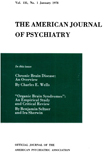THE RÔLE OF THE PREMORBID PERSONALITY IN ARTERIOSCLEROTIC PSYCHOSES
Abstract
A study of the clinical-anatomic relationships in arteriosclerotic psychoses reveals numerous inconsistencies, which indicate that different persons vary greatly in their ability to withstand cerebral damage.
The observations suggest that individuals who are in any way handicapped psychologically are highly vulnerable to arteriosclerotic psychoses. A considerable number of patients displayed inadequate and unstable personalities; less frequently, situational stress was noted. Such patients break down mentally in the face of damage which persons of a stable make-up could successfully withstand.
Extensive cerebral changes may produce a psychosis in anyone, but the anatomic factor can be regarded as all-important in only a minority of the group. In the other cases, responsibility for the psychosis is shared by factors of personality.
Access content
To read the fulltext, please use one of the options below to sign in or purchase access.- Personal login
- Institutional Login
- Sign in via OpenAthens
- Register for access
-
Please login/register if you wish to pair your device and check access availability.
Not a subscriber?
PsychiatryOnline subscription options offer access to the DSM-5 library, books, journals, CME, and patient resources. This all-in-one virtual library provides psychiatrists and mental health professionals with key resources for diagnosis, treatment, research, and professional development.
Need more help? PsychiatryOnline Customer Service may be reached by emailing [email protected] or by calling 800-368-5777 (in the U.S.) or 703-907-7322 (outside the U.S.).



